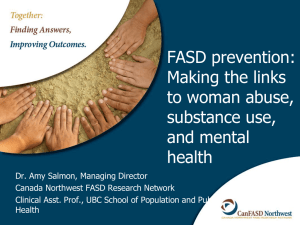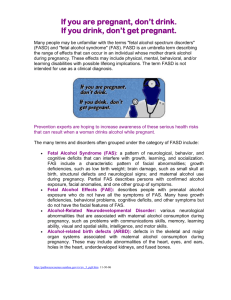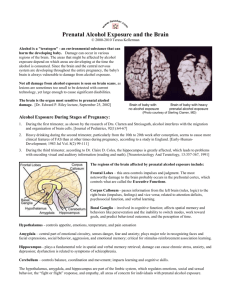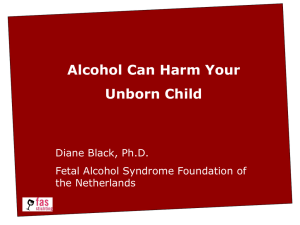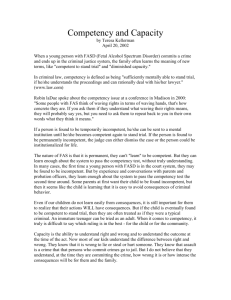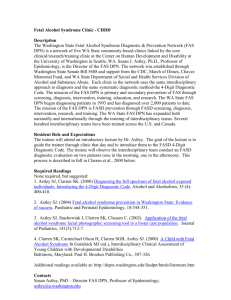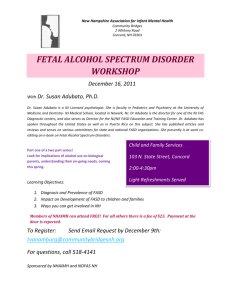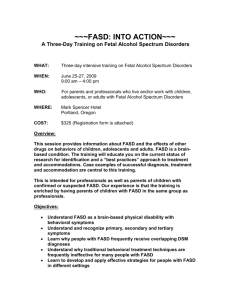Fetal Alcohol Syndrome - University of Washington
advertisement
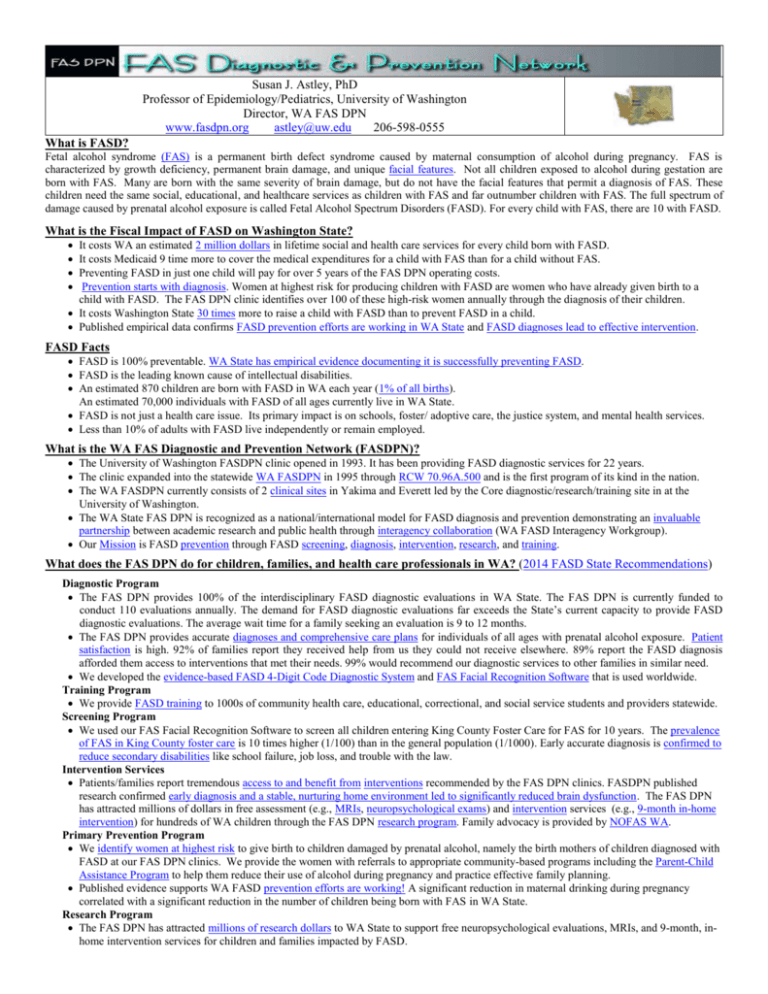
Susan J. Astley, PhD Professor of Epidemiology/Pediatrics, University of Washington Director, WA FAS DPN www.fasdpn.org astley@uw.edu 206-598-0555 What is FASD? Fetal alcohol syndrome (FAS) is a permanent birth defect syndrome caused by maternal consumption of alcohol during pregnancy. FAS is characterized by growth deficiency, permanent brain damage, and unique facial features. Not all children exposed to alcohol during gestation are born with FAS. Many are born with the same severity of brain damage, but do not have the facial features that permit a diagnosis of FAS. These children need the same social, educational, and healthcare services as children with FAS and far outnumber children with FAS. The full spectrum of damage caused by prenatal alcohol exposure is called Fetal Alcohol Spectrum Disorders (FASD). For every child with FAS, there are 10 with FASD. What is the Fiscal Impact of FASD on Washington State? It costs WA an estimated 2 million dollars in lifetime social and health care services for every child born with FASD. It costs Medicaid 9 time more to cover the medical expenditures for a child with FAS than for a child without FAS. Preventing FASD in just one child will pay for over 5 years of the FAS DPN operating costs. Prevention starts with diagnosis. Women at highest risk for producing children with FASD are women who have already given birth to a child with FASD. The FAS DPN clinic identifies over 100 of these high-risk women annually through the diagnosis of their children. It costs Washington State 30 times more to raise a child with FASD than to prevent FASD in a child. Published empirical data confirms FASD prevention efforts are working in WA State and FASD diagnoses lead to effective intervention. FASD Facts FASD is 100% preventable. WA State has empirical evidence documenting it is successfully preventing FASD. FASD is the leading known cause of intellectual disabilities. An estimated 870 children are born with FASD in WA each year (1% of all births). An estimated 70,000 individuals with FASD of all ages currently live in WA State. FASD is not just a health care issue. Its primary impact is on schools, foster/ adoptive care, the justice system, and mental health services. Less than 10% of adults with FASD live independently or remain employed. What is the WA FAS Diagnostic and Prevention Network (FASDPN)? The University of Washington FASDPN clinic opened in 1993. It has been providing FASD diagnostic services for 22 years. The clinic expanded into the statewide WA FASDPN in 1995 through RCW 70.96A.500 and is the first program of its kind in the nation. The WA FASDPN currently consists of 2 clinical sites in Yakima and Everett led by the Core diagnostic/research/training site in at the University of Washington. The WA State FAS DPN is recognized as a national/international model for FASD diagnosis and prevention demonstrating an invaluable partnership between academic research and public health through interagency collaboration (WA FASD Interagency Workgroup). Our Mission is FASD prevention through FASD screening, diagnosis, intervention, research, and training. What does the FAS DPN do for children, families, and health care professionals in WA? (2014 FASD State Recommendations) Diagnostic Program The FAS DPN provides 100% of the interdisciplinary FASD diagnostic evaluations in WA State. The FAS DPN is currently funded to conduct 110 evaluations annually. The demand for FASD diagnostic evaluations far exceeds the State’s current capacity to provide FASD diagnostic evaluations. The average wait time for a family seeking an evaluation is 9 to 12 months. The FAS DPN provides accurate diagnoses and comprehensive care plans for individuals of all ages with prenatal alcohol exposure. Patient satisfaction is high. 92% of families report they received help from us they could not receive elsewhere. 89% report the FASD diagnosis afforded them access to interventions that met their needs. 99% would recommend our diagnostic services to other families in similar need. We developed the evidence-based FASD 4-Digit Code Diagnostic System and FAS Facial Recognition Software that is used worldwide. Training Program We provide FASD training to 1000s of community health care, educational, correctional, and social service students and providers statewide. Screening Program We used our FAS Facial Recognition Software to screen all children entering King County Foster Care for FAS for 10 years. The prevalence of FAS in King County foster care is 10 times higher (1/100) than in the general population (1/1000). Early accurate diagnosis is confirmed to reduce secondary disabilities like school failure, job loss, and trouble with the law. Intervention Services Patients/families report tremendous access to and benefit from interventions recommended by the FAS DPN clinics. FASDPN published research confirmed early diagnosis and a stable, nurturing home environment led to significantly reduced brain dysfunction. The FAS DPN has attracted millions of dollars in free assessment (e.g., MRIs, neuropsychological exams) and intervention services (e.g., 9-month in-home intervention) for hundreds of WA children through the FAS DPN research program. Family advocacy is provided by NOFAS WA. Primary Prevention Program We identify women at highest risk to give birth to children damaged by prenatal alcohol, namely the birth mothers of children diagnosed with FASD at our FAS DPN clinics. We provide the women with referrals to appropriate community-based programs including the Parent-Child Assistance Program to help them reduce their use of alcohol during pregnancy and practice effective family planning. Published evidence supports WA FASD prevention efforts are working! A significant reduction in maternal drinking during pregnancy correlated with a significant reduction in the number of children being born with FAS in WA State. Research Program The FAS DPN has attracted millions of research dollars to WA State to support free neuropsychological evaluations, MRIs, and 9-month, inhome intervention services for children and families impacted by FASD.
